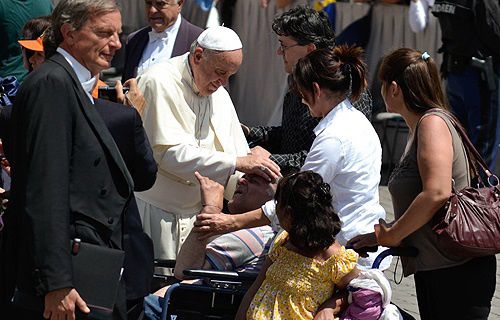Pope Francis centered his daily homily on the Beatitudes, stating that they are Jesus’ practical guide on how to live the Christian life, which often goes against what the world tells us. The beatitudes are a “program,” the “identity card of a Christian,” the Pope explained in his June 9 daily Mass, adding that they are “few words, simple words, but practical for all.” “Because Christianity is a practical religion: it is not just to be imagined, it is to be practiced.” Addressing those present in the Vatican’s Saint Martha guesthouse, the Roman Pontiff focused his words on each of the beatitudes taken from the fifth chapter of Matthew’s Gospel, beginning with “Blessed are the poor in spirit.” Wealth, he observed, gives us no true certainty, but rather suffocates the need for God and his Word, because the heart that is rich and self-satisfied has no room for them. “Blessed are they who mourn for they will be comforted…The world tells us that happiness, joy and entertainment are the best things in life,” the pontiff continued, but “it looks the other way when there are problems of disease or pain in the family.” Explaining how the world often “covers up” suffering because it prefers to “ignore painful situations,” the Bishop of Rome noted that “Only the person who sees things as they are, and whose heart mourns, will be happy and will be comforted. Thanks to the consolation of Jesus, not to that of the world.” “Blessed are the meek in this world which is filled with wars, arguments, hatred. And Jesus says: no war, no hatred. Peace and meekness,” he went on, observing that often “if you are meek in life, people will think you are not clever.” “But you are meek because with this meekness you will inherit the Earth.” Moving onto the beatitude of those who “hunger and thirst for righteousness,” Pope Francis pointed out how easy it is to become corrupt and to take on the attitude of “everything is business.” Lamenting the many injustices that are created on account of this mentality, the Pope stated that “Blessed are they who fight against injustice” and “Blessed are the merciful for they will be shown mercy.” The merciful are “those who forgive and understand the mistakes of others,” he noted, adding that Jesus does not tell us “blessed are they who seek revenge.” “Blessed are they who forgive, who are merciful. Because we are all part of an army of people who have been forgiven! We have all been forgiven. That is why blessed is he who undertakes this path of forgiveness.” Going on, the Roman Pontiff drew attention to the beatitude “blessed are the pure of heart,” those who “have a simple, pure heart without dirt, a heart that knows how to love with purity.” “Blessed are peace-makers,” he said, lamenting that “it is so common amongst us to be war-makers or perpetrators of misunderstandings!” “When I hear something from one person, and I go and say it to someone else in a second, enlarged, edition,” this is “the world of gossip,” the Pope observed, explaining that “people who gossip, who do not make peace, are enemies of peace. They are not blessed.” Turning to the beatitude of those that are “persecuted for the sake of righteousness,” the Bishop of Rome called to mind the many who have been and who “continue to be persecuted simply for having fought for justice.” All the beatitudes together, he explained, signify “a program for life offered to us by Jesus,” a program that is “so simple and yet so difficult.” Concluding his homily, Pope Francis told those present that “if you have some time at home today, take the Gospel, Matthew’s Gospel, Chapter 5. At the beginning there are the Beatitudes; in Chapter 25 the rest.” “It will do you good to read them once, twice, three times,” he said, “read this program for holiness. May the Lord give us the grace to understand his message.” Following his Mass, Pope Francis met with Cardinal George Pell, prefect of the Secretariat for the Economy, and then canceled his appointments for the rest of the morning due to tiredness following last night’s invocation for peace with the Israeli and Palestinian presidents.

